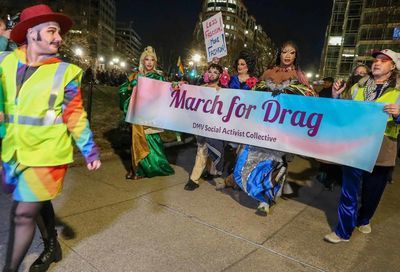Stafford County supervisors pass resolution condemning critical race theory and “required” pronouns in schools
Sponsor says his resolution would not prevent transgender students from making individual requests regarding preferred pronouns.

The Stafford County Board of Supervisors passed a resolution on Tuesday condemning the inclusion of so-called “critical race theory” in classroom instruction and discouraging teachers from requiring students to select their preferred pronouns.
The board, with one member absent, voted unanimously to pass the resolution, which enables supervisors to withhold any county funding from schools found to be in violation of the county’s resolution.
For instance, the board of supervisors could choose to withhold money in cases where a teacher proactively asks students about their gender pronouns, even if that teacher’s intent was to make transgender or nonbinary students feel comfortable.
Similarly, the board could deny funding in cases where teachers seek to incorporate critical race theory or ideas inspired by the 1619 Project, a long-form journalism project that seeks to “reframe the country’s history by placing the consequences of slavery and the contributions of Black Americans at the very center of the United States’ national narrative,” into the curriculum.
Supervisor Gary Snellings (R-Hartwood District), the sponsor of the resolution, says that it does not mean that all funding will be stripped from schools, but rather that the board of supervisors could intercede and override the school board by denying funding for specific projects at schools found to be in violation, according to D.C.-area affiliate Fox 5.
“If the school board wants to do what Fairfax County did and bring in a guy that is quote an expert in CRT…and pay him $20,000, if our school board decides to do that…this resolution will give us the authority to deduct that 20,000 dollars at the next budget time,” Snellings said. “It does not give us the authority to reduce school funding.”
According to Fox 5, Snellings said he introduced the resolution based on a call from a constituent who was upset that her son, who had just entered high school, was reportedly asked by a female teacher what his preferred pronouns were.
“He didn’t know what she was talking about,” Snellings told board members. “He felt bullied.”
Some opponents of the resolution questioned why it lumped together two unrelated issues. However, the two issues, and the broader topics of race relations and transgender rights that they touch upon, are often opposed by people who are politically conservative, and have become wedge-issues pounced upon by Republicans and conservatives during an election year when the GOP is seeking to drive up turnout in order to take back the governor’s mansion, the attorney general’s office, and control of the General Assembly.
“The fact that you’ve included pronouns in critical race theory revision is ridiculous to say the least,” one resident who spoke at the meeting said. “Asking for somebody’s pronouns isn’t just common courtesy to anybody, it’s also making sure that people feel safe.”
Regarding pronoun usage, Snellings says his resolution is about ensuring that students aren’t required to give teachers their pronouns, not about prohibiting transgender students from requesting that teachers use their preferred pronouns.
“State law says that you cannot ask a student their pronoun, you cannot require them to give it,” he said of teachers’ responsibilities. “It says if the student or the student’s parent goes to the teacher, and asks that a preferred pronoun be applied to them or their child, a teacher must do that.”
Regarding critical race theory, supervisors sought to respond to concerns that the collegiate-level theory — which examines the intersection of race and various social, justice, and cultural issues — was being pushed on children, with some speakers claiming it stokes racial animus towards whites by labeling them “oppressors,” portrays people of color as victims, and will only divide people among racial and ideological lines.
Stafford County Public Schools Superintendent has previously testified before the board of supervisors that critical race theory is not being taught in schools, noting that residents can visit the History and Social Science page of the school system’s website to find out what’s being taught.
“Stafford County Public Schools does not teach, nor do we promote, the philosophy of Critical Race Theory in any of our schools,” the school system said in a statement. “The Stafford County Public Schools K12 History and Social Science Program is based on the Virginia Standards of Learning and the accompanying History and Social Science Curriculum Framework.”

But some people, including opponents of the resolution and Supervisor Tom Coen (I-George Washington District), who voted for the resolution, said that “critical race theory” — at least as the terms is used by political pundits and activists — is a catch-all term that doesn’t accurately reflect what the theory entails. He also said he’s seen no indication that the theory is actually being taught in the classroom.
“Yes, CRT is a very complex issue. It is dealt with on the college, university and law school level. It is also very divisive,” Coen, a high school teacher by occupation, said. “The higher levels haven’t figured out how they want to cover that, so it’s hard to think that a third-grade teacher, schoolteacher or a high school teacher can do that, if the colleges haven’t figured it out.”
But Coen also appeared to imply, in an interview with D.C.-area news radio station WTOP, that some people may be unintentionally conflating — or perhaps even deliberately misrepresenting — valid historical topics that happen to touch on race with CRT.
“Now let’s be clear,” Coen said. “There are certain things under the CRT umbrella that are taught, as part of curriculums in social studies classes, and government classes, and they are legitimate topics to be covered: Jim Crow laws, the Voting Act, Fourth Amendment and the policy created by Mayor Bloomberg on stop and frisk. Those things can be covered, and the teacher is not talking about CRT.”
See also:
LGBTQ youths are less likely to play sports due to fear of bullying or harassment, says survey
Support Metro Weekly’s Journalism
These are challenging times for news organizations. And yet it’s crucial we stay active and provide vital resources and information to both our local readers and the world. So won’t you please take a moment and consider supporting Metro Weekly with a membership? For as little as $5 a month, you can help ensure Metro Weekly magazine and MetroWeekly.com remain free, viable resources as we provide the best, most diverse, culturally-resonant LGBTQ coverage in both the D.C. region and around the world. Memberships come with exclusive perks and discounts, your own personal digital delivery of each week’s magazine (and an archive), access to our Member's Lounge when it launches this fall, and exclusive members-only items like Metro Weekly Membership Mugs and Tote Bags! Check out all our membership levels here and please join us today!
























You must be logged in to post a comment.